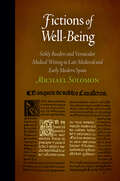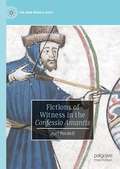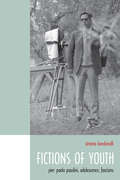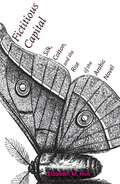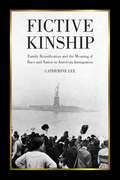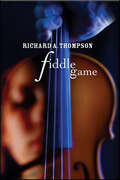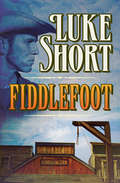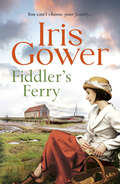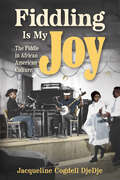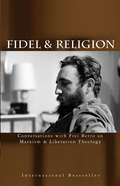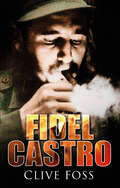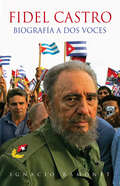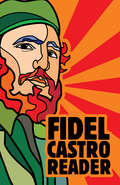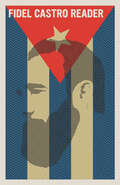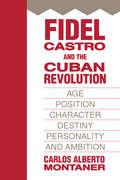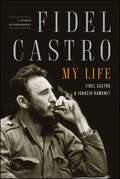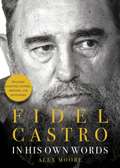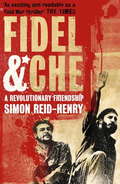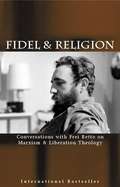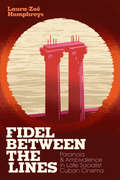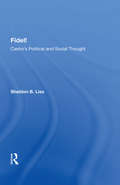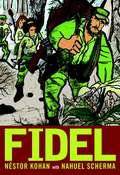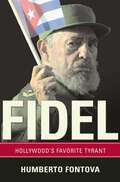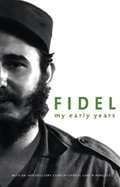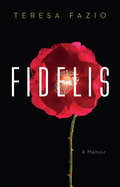- Table View
- List View
Fictions of Well-Being: Sickly Readers and Vernacular Medical Writing in Late Medieval and Early Modern Spain
by Michael SolomonFrom the fourteenth through the sixteenth centuries in Spain, health-related information in the vernacular began to circulate widely in treatises, compendiums, manuals, plague tracts, summaries, encyclopedias, and recipe collections. These were often the work of concerned physicians who attempted to refashion medical information to appeal to nonprofessionals. In Fictions of Well-Being Michael Solomon explores the shaping of this audience of sickly readers, highly motivated individuals who, when confronted with the painful, disruptive, and often alienating conditions of physical disorder, looked for relief in books.Vernacular medical writing from late medieval and early modern Spain emerged from the interrelated imperatives to address the immediate or future hygienic and pathological needs of the patient while promoting the reputation and learned credentials of the physician. For sickly readers, a medical treatise was more than just a collection of technical information; such a work implied that they could do with a medical text what the physician normally did at the bedside. In their imagination, the treatise became a type of palpable instrument that encouraged the reader to take advantage of its possible use and benefits. In these fictions of well-being, we may see the antecedents of the self-help and popular medical books so prominent on today's best-seller lists.
Fictions of Witness in the Confessio Amantis (The New Middle Ages)
by Joel FredellFictions of Witness in the Confessio Amantis details the first years of the Confessio’s material history and offers a major revision to a century’s old narrative of political revision and conversion around the trauma of 1400. Joel Fredell argues for “late stage” revisions by Gower to his great poem in Middle English from the late 1390s up to Gower’s death in 1408. This approach, new to scholarship for Ricardian and Lancastrian literature, demands profound re-evaluation of Gower's poetic persona and its entanglement in the opening and closing books of the Confessio. It offers a reassessment of the political and literary relationships between versions dedicated to Richard II and Henry IV. It repositions Gower's laureate status in a London world of deluxe book production that created a canon of Ricardian poets linked to their fifteenth-century inheritors. Finally, it identifies for the first time how late medieval authors designed their poetry as fictional artifacts that witness history from quasi-chronicles like Maidstone’s Concordia or Richard the Redeless, quasi-petitions like the Lollard “Petition to the King and Parliament,” quasi-epistles that begin so many texts, quasi-transcripts such as the Record and Process of the Deposition of Richard II, and so on.
Fictions of Youth
by Simona BondavalliFictions of Youth is a comprehensive examination of adolescence as an aesthetic, sociological, and ideological category in Pier Paolo Pasolini's prose, poetry, and cinema. Simona Bondavalli's book explores the multiple ways in which youth, real and imagined, shaped Pasolini's poetics and critical positions and shows how Pasolini's works became the basis for representations of contemporary young people, particularly Italians. From Pasolini's own coming of age under Fascism in the 1940s to the consumer capitalism of the 1970s, youth stood for innocence, vitality, and rebellion. Pasolini's representations of youth reflected and shaped those ideas.Offering a systematic treatment of youth and adolescence within Pasolini's eclectic body of work, Fictions of Youth provides both a broad overview of the changing nature of youth within Italian modernity and an in-depth study of Pasolini's significant contribution to that transformation.
Fictitious Capital: Silk, Cotton, and the Rise of the Arabic Novel
by Elizabeth M. HoltThe ups and downs of silk, cotton, and stocks syncopated with serialized novels in the late-nineteenth-century Arabic press: Time itself was changing. Novels of debt, dissimulation, and risk begin to appear in Arabic at a moment when France and Britain were unseating the Ottoman legacy in Beirut, Cairo, and beyond. Amid booms and crashes, serialized Arabic fiction and finance at once tell the other’s story.While scholars of Arabic often write of a Nahdah, a sense of renaissance, Fictitious Capital argues instead that we read the trope of Nahdah as Walter Benjamin might have, as “one of the monuments of the bourgeoisie that [are] already in ruins.” Financial speculation engendered an anxious mixture of hope and fear formally expressed in the mingling of financial news and serialized novels in such Arabic journals as Al-Jinān, Al-Muqtataf, and Al-Hilāl. Holt recasts the historiography of the Nahdah, showing its sense of rise and renaissance to be a utopian, imperially mediated narrative of capital that encrypted its inevitable counterpart, capital flight.
Fictive Kinship: Family Reunification and the Meaning of Race and Nation in American Migration
by Catherine LeeToday, roughly 70 percent of all visas for legal immigration are reserved for family members of permanent residents or American citizens. Family reunification—policies that seek to preserve family unity during or following migration—is a central pillar of current immigration law, but it has existed in some form in American statutes since at least the mid-nineteenth century. In Fictive Kinship, sociologist Catherine Lee delves into the fascinating history of family reunification to examine how and why our conceptions of family have shaped immigration, the meaning of race, and the way we see ourselves as a country. Drawing from a rich set of archival sources, Fictive Kinship shows that even the most draconian anti-immigrant laws, such as the Chinese Exclusion Act of 1882, contained provisions for family unity, albeit for a limited class of immigrants. Arguments for uniting families separated by World War II and the Korean War also shaped immigration debates and the policies that led to the landmark 1965 Immigration Act. Lee argues that debating the contours of family offers a ready set of symbols and meanings to frame national identity and to define who counts as “one of us.” Talk about family, however, does not inevitably lead to more liberal immigration policies. Welfare reform in the 1990s, for example, placed limits on benefits for immigrant families, and recent debates over the children of undocumented immigrants fanned petitions to rescind birthright citizenship. Fictive Kinship shows that the centrality of family unity in the immigration discourse often limits the discussion about the goals, functions and roles of immigration and prevents a broader definition of American identity. Too often, studies of immigration policy focus on individuals or particular ethnic or racial groups. With its original and wide-ranging inquiry, Fictive Kinship shifts the analysis in immigration studies toward the family, a largely unrecognized but critical component in the regulation of immigrants’ experience in America.
Fiddle Game (Herman Jackson Series #0)
by Richard A. ThompsonHerman Jackson has chosen St. Paul as his place of permanent exile from Detroit, where his former life as a bookie got too hot to hold. Now he leads a respectable, low-profile life as a bail bondsman, selling second chances to losers and looking over his shoulder. When a young woman named Amy Cox leaves Jackson a priceless antique violin as security for her brother's bail bond, it's really the beginning of an elaborate con game. But the game is barely underway when she is brutally murdered in front of Jacksons office. And for reasons that make no sense, the police are calling him the prime suspect. That is, unless he gives them the violin as evidence. With his criminal past, Jackson can't afford to be a prime suspect for jaywalking. But neither is he prepared to give in to extortion. Soon he is on the road and on the run, trying to solve Amy Cox's murder, pursued by one real and one crooked cop, a band of urban Gypsies who claim to have first rights to the violin, and an unknown killer who also wants Jackson dead. Nobody is who he claims to be, nothing is what it seems, and the violin, which is reputed to carry a 400-year-old curse, begins to take on a life of its own. While Jackson tries to sort it all out, the killing continues, and suddenly his old life back in Detroit doesn't look so dangerous at all.
Fiddlefoot
by Luke ShortA hard-charging tale of oppression and revenge by an award-winning author who helped define the western genre. Frank Chess didn&’t care for much in this world. Especially himself. So taking a job for local big shot Rhino Hulst was an easy choice. Each day drifted into the next: running Rhino&’s crooked errands, blowing his meager pay in the nearest poker game, drinking it down in the closest saloon, and handing it over to the next soiled dove. All because Rhino killed a man in cold blood, pinned it on Frank, and now holds the hangman&’s rope over him. And who would give a damn? Frank came into town a drifter—a fiddlefoot, they called him—worth nothing to no one. He didn&’t matter. But none of the townspeople know Frank. Where he came from. What he&’s done. And when he finally remembers what it&’s like to care about something, they have no idea how much hell he&’s about to bring down on them all. Along with legendary authors like Zane Grey and Louis L&’Amour, Luke Short helped transform the stories of the American West from dime-store pulp into a respected and immensely popular literary genre. Originally serialized in the Saturday Evening Post, Fiddlefoot combines Short&’s plainspoken style with the hard-edged authenticity that marks his novels as true classics of western adventure.
Fiddler's Ferry
by Iris GowerOne woman&’s near tragedy propels this compelling, touching, and powerful Welsh family saga from the bestselling author of Spinner&’s Wharf. The Llywelyn family&’s livelihood largely depends on the ferry, run by Siona Llywelyn, the kindly yet rugged head of the family. The family is large but close knit, held together by their mother Emily—a hard-working woman made old before her time having borne seven sons, and now with child once again. As the boys grow into young men, tensions flare in the family unit, made worse by a web of rivalries and ambitions. When a death shocks the family to its core, it will take the intervention of a special person to remind them of what they have lost. Praise for the writing of Iris Gower &“Iris Gower writes with warmth and fluency.&” —The Yorkshire Post &“A series well worth watching.&” —Publishing News &“An atmospheric, compassionate tale.&” —Daily Post &“Packed with action, drama and tragedy.&” —South Wales Evening Post
Fiddling Is My Joy: The Fiddle in African American Culture (American Made Music Series)
by Jacqueline Cogdell DjeDjeIn Fiddling Is My Joy, Jacqueline Cogdell DjeDje examines the history of fiddling among African Americans from the seventeenth to the mid-twentieth century. Although music historians acknowledge a prominent African American fiddle tradition during the era of slavery, only recently have researchers begun to closely examine the history and social implications of these musical practices. Research on African music reveals a highly developed tradition in West Africa, which dates to the eleventh or twelfth century and continues today. From these West African roots, fiddling was prominent in many African American communities between the seventeenth and nineteenth centuries, and the fiddle became an important instrument in early twentieth-century blues, jazz, and jug bands. While less common in late twentieth-century African American jazz and popular music groups, the fiddle remained integral to the musicking of some Black musicians in the rural South.Featured in Fiddling Is My Joy is access to a comprehensive online eScholarship Companion that contains maps, photographs, audiovisual examples, and other materials to expand the work of this enlightening and significant study. To understand the immense history of fiddling, DjeDje uses geography to weave together a common thread by profiling the lives and contributions of Black fiddlers in various parts of the rural South and Midwest, including the mountains and along the Atlantic and Gulf coasts. In addition to exploring the extent that musical characteristics and aesthetics identified with African and European cultures were maintained or reinterpreted in Black fiddling, she also investigates how the sharing of musical ideas between Black and white fiddlers affected the development of both traditions. Most importantly, she considers the contradiction in representation. Historical evidence suggests that the fiddle may be one of the oldest uninterrupted instrumental traditions in African American culture, yet most people in the United States, including African Americans, do not identify it with Black music.
Fidel & Religion: Conversations with Frei Betto on Marxism & Liberation Theology
by Fidel Castro Frei Betto Armando HartA bestseller that offers an intimate insight into Fidel Castro, the man behind the beard! · This historic encounter between religion and revolution paved the way for Pope John Paul II's historic visit to Cuba in 1999 and the rule change in the Cuban Communist Party (1992) accepting as members those practicing their religious faith ·
Fidel Castro
by Clive FossFidel Castro is a dynamic and charismatic leader, who has led Cuba through success and failures since 1959. Son of a rich landowner, he became a radical revolutionary who attempted to overthrow the government in 1956 with a tiny band of followers. Using propaganda and subversion as much as sudden attacks from his mountain hideout, he gained victory in 1959. He liberated his country from one dictator and the overwhelming influence of the United States, only to turn it into another dictatorship firmly under the control and patronage of the Soviet Union. The failure of the American attack at the Bay of Pigs in 1961 added to his reputation, while the missile crisis of 1962 put Cuba right at the centre of the Cold War. Later, by sending his army to Africa and supporting guerrilla movements in Latin America, he made Cuba a signficant player on the world stage. Despite many attempts to remove him and the economic collapse of the USSR, Castro survived and in 1999, celebrated 40 years of his regime.
Fidel Castro
by Ignacio RamonetSociólogo, teórico de la cultura, periodista y una de las voces más representativas del movimiento altermundista, Ignacio Ramonet ha logrado desvelar -tras semanas de intensas conversaciones- las claves de la Revolución cubana a través de la biografía humana y política del último «monstruo sagrado» de la política internacional: el polémico Fidel Castro. Testimonio excepcional y análisis histórico, este libro es una auténtica «biografía a dos voces»: la memoria oral del comandante. ¿Cómo fue su infancia? ¿Dónde y cuándo se forjó el rebelde? ¿Cómo eran sus relaciones con Che Guevara? ¿Estuvo el mundo al borde de una guerra nuclear durante la llamada «crisis de los misiles»? ¿Cuántas veces han querido asesinarlo? ¿Qué impresión le causó el Papa Juan Pablo II cuando visitó la isla en 1998? ¿Por qué critica tanto a Felipe González y a José María Aznar mientras alaba la figura del rey Juan Carlos? ¿Qué piensa de la globalización neoliberal, de la guerra de Irak y del presidente Bush? ¿Por qué las autoridades cubanas arrestaron a unos setenta opositores no violentos en marzo de 2003 y aplicaron, ese mismo año, la pena de muerte a los secuestradores de una lancha? ¿Existe la corrupción en el régimen? ¿Es el socialismo en Cuba realmente «irreversible»? ¿Hacia dónde caminala política y la economía de la isla? ¿Qué ocurrirá después de Fidel Castro? El exhaustivo cuestionario de Ignacio Ramonet -más de cien horas de entrevistas y de inéditas revelaciones- es al tiempo un recorrido apasionante por la controvertida figura de Fidel Castro y un formidable relato sobre el pasado, el presente y el porvenir de la Revolución.
Fidel Castro Reader
by Fidel Castro David DeutschmannAn outstanding new anthology of one of history's greatest oratorsHere, at last, is a comprehensive anthology presenting the voice of one of history's greatest orators, Fidel Castro. Love him or hate him, there is no denying he is a "master of the spoken word," as Gabriel García Márquez has described him.Emerging in the 1960s as a leading voice in support of Third World anticolonial struggles and continuing to play a role in the antiglobalization movement of today, Fidel Castro remains an articulate and penetrating--if controversial--political thinker and leader, who has outlasted ten hostile US presidents.His direct, forthright approach, his incredible grasp of diverse economic, historical, and cultural topics, and his idealism stand in stark contrast against the spin and superficiality of most political leaders.Covering five decades of Fidel's speeches, this selection begins with his famous courtroom defense ("History will Absolve Me"), and also includes his speech on learning of Che Guevara's death in Bolivia, his analysis of the collapse of the Soviet Union, and his response to the 9/11 terrorist attacks. With his declining health and the emergence of new leaders such as Hugo Chávez in Venezuela and Evo Morales in Bolivia, this book sheds light not just on Castro's mighty role in Latin America's immediate past, but also on his legacy for the future.The Fidel Castro Reader includes a chronology of the Cuban Revolution, an extensive glossary and index as well as 24 pages of photos. As the first anthology of Castro's speeches to be published in English since the 1960s, this is an essential resource for both scholars and general readers. "Fidel's devotion to the word is almost magical." -- Gabriel García Márquez "Fidel is the leader of one of the smallest countries in the world, but he has helped to shape the destinies of millions of people across the globe."--Angela Davis "Fidel Castro is a man of the masses... The Cuban revolution has been a source of inspiration to all freedom-loving people."--Nelson Mandela "Fidel's is a singing and dancing intellect."--Alice Walker "The editors] have done an admirable, even heroic, job of editing and excerpting this reader [which] serves a purpose for both historians and politicos." --Foreword magazine
Fidel Castro Reader
by Fidel CastroA comprehensive anthology with more than 30 speeches that span five decades by Fidel Castro, one of history&’s greatest orators.Emerging in the 1960s as a leading voice in support of anticolonial struggles, then continuing to play a role in the antiglobalization movement in the subsequent decades, Fidel Castro was an articulate and penetrating—if controversial—political thinker and leader, who outlasted ten US presidents.Covering five decades of Fidel&’s speeches, this selection begins with his famous courtroom defense (&“History will Absolve Me&”), and also includes his speech on learning of Che Guevara&’s death in Bolivia, his analysis of the collapse of the Soviet Union, and his response to the 9/11 terrorist attacks. With his declining health and the emergence of new leaders such as Hugo Chávez in Venezuela and Evo Morales in Bolivia, this book sheds light not just on Castro&’s mighty role in Latin America&’s past, but also on his legacy for the future. Love him or hate him, this anthology demonstrates that Fidel Castro is a &“master of the spoken word,&” as Gabriel García Márquez has described him.The Fidel Castro Reader includes a chronology of the Cuban Revolution, an extensive glossary and index as well as 24 pages of photos.
Fidel Castro and the Cuban Revolution: Age, Position, Character, Destiny, Personality, and Ambition
by Carlos Alberto MontanerPerhaps the foremost social analyst and journalist on Cuban affairs, Carlos Alberto Montaner has written a definitive study of the Cuban regime from the vantage point of the Cuban dictator. This is not simply a history of Cuban communism but rather a personal history of its leader, Fidel Castro. Montaner's extraordinary knowledge of the country and its politics prevents the work from becoming a psychiatric examination from afar. Indeed, what personal irrationalities exist are seen as built into the fabric of the regime itself, and not simply as a personality aberration.Fidel Castro and the Cuban Revolution is not an apologia for past United States involvement in Cuban affairs. The author is severe in his judgments of such participation. Nor is he sparing in his sense of the betrayal of the original purposes of the Revolution of 1959 manifested in the character and policies of Fidel Castro. As the work progresses from a study of the victims to a study of the beneficiaries of the Cuban Revolution, it leaves the reader with a deep sense of the tragedy of a revolution betrayed, but not one that could have easily been avoided.Montaner is an ""exile"" like the great Alexander Herzen before him. His decision to live in Europe was made by choice, not of necessity. He sees his role as critical analyst, not as restoring the status quo ante. A most valuable aspect of this book is its intimate reevaluation of Fulgencio Batista. Whatever the reader's judgment of Montaner's work, no one can read it and be dismissive of the effort. It is a work of intimacy even through written in exile--and hence must be viewed as an important effort to understand the character of the man and regime who have changed the course of Cuban history in our times.
Fidel Castro: A Spoken Autobiography
by Fidel Castro Ignacio Ramonet Andrew HurleyFidel Castro is perhaps the most charismatic and controversial head of state in modern times. A dictatorial pariah to some, he has become a hero and inspiration for many of the world's poor, defiantly charting an independent and revolutionary path for Cuba over nearly half a century. Numerous attempts have been made to get Castro to tell his own story. But only now, in the twilight of his years, has he been prepared to set out the details of his remarkable biography for the world to read. This book is nothing less than his living testament. As he told reporters, his desire to finish checking its text was the one thing that kept him going through his recent illness. He presented a copy of the book in its Spanish edition to his compadre President Hugo Chávez of Venezuela. In these pages, Castro narrates a compelling chronicle that spans the harshness of his elementary school teachers; the early failures of the revolution; his intense comradeship with Che Guevara and their astonishing, against-all-odds victory over the dictator Batista; the Cuban perspective on the Bay of Pigs and the ensuing missile crisis; the active role of Cuba in African independence movements (especially its large military involvement in fighting apartheid South Africa in Angola); his relations with prominent public figures such as Boris Yeltsin, Pope John Paul II, and Saddam Hussein; and his dealings with no less than ten successive American presidents, from Eisenhower to George W. Bush. Castro talks proudly of increasing life expectancy in Cuba (now longer than in the United States); of the half million students in Cuban universities; and of the training of seventy thousand Cuban doctors nearly half of whom work abroad, assisting the poor in Africa, Asia, and Latin America. He is confronted with a number of thorny issues, including democracy and human rights, discrimination toward homosexuals, and the continuing presence of the death penalty on Cuban statute books. Along the way he shares intimacies about more personal matters: the benevolent strictness of his father, his successful attempt to give up cigars, his love of Ernest Hemingway's novels, and his calculation that by not shaving he saves up to ten working days each year. Drawing on more than one hundred hours of interviews with Ignacio Ramonet, a knowledgeable and trusted interlocutor, this spoken autobiography will stand as the definitive record of an extraordinary life lived in turbulent times.
Fidel Castro: In His Own Words
by Alex MooreFrom revolutionary and symbol of strength to Cold War adversary, Fidel Castro was one of the world’s most controversial leaders, and perhaps its most enduring. As Cuba’s towering and charismatic president for nearly fifty years, Castro’s influential leadership captivated allies and enemies alike. By virtue of passionate oration and committed sense of purpose-good or bad-Castro kept the Cuban people devoted and the world enthralled.From his earliest years as a student rebel to his role in Cuba's social reform to The Cuban Missile Crisis, his life is covered in extensive detail within this book. The transfer of power to Raul Castro is explored as well as the changes to Cuban/American diplomatic relations, including Obama’s view of America’s relationship with Cuba. Castro’s death is covered as well as the world’s the reaction to it, including the views of American and Cuban people and the differing reactions of Obama and Trump.
Fidel and Che: The Revolutionary Friendship Between Fidel Castro and Che Guevara
by Simon Reid-Henry'As exciting and readable as a Cold War thriller' The Times'Brings back the danger and intense emotions of that revolutionary period...it reads like adventure fiction' IndependentThe story of the remarkable and revolutionary friendship between two of the most iconic figures in twentieth century history - Fidel Castro and Ernesto 'Che' Guevara.Not yet thirty, Fidel Castro and Ernesto Guevara met in 1955 while both in exile in Mexico City. Guevara, the Argentine doctor plagued by asthma, had reached the end of the travels he began by motorcycle several years before. Fidel Castro, peasant's son, scholar and rebel, had just fled Cuba, fearing for his life. Over the next twelve years, until Guevara's death in 1967, their journey together would take them from the safe houses of Mexico's political underground, to war in the Cuban mountains and ultimately into the heart of the Cold War. Drawing on extensive research, including declassified material and interviews with key figures in Havana, Moscow and Washington, Simon Reid-Henry uncovers, for the first time, the full story behind the central relationship of the Cuban revolution: their shared revolutionary ambitions, their conflicting personalities, the wilfulness that bound them together and the pressures that would tear them apart. Fidel and Che is the story of two men who shared a common dream; who became friends, comrades and brothers-in-arms; and who, finally, would make an epic choice between their friendship and their beliefs.
Fidel and Religion: Fidel Castro in Conversation with Frei Betto on Marxism and Liberation Theology
by Fidel Castro Frei BettoIn an intimate 23-hour dialogue with Brazilian liberation theologist Frei Betto, Fidel Castro revealed much about his personal background and candidly discussed his views on religion.
Fidel between the Lines: Paranoia and Ambivalence in Late Socialist Cuban Cinema
by Laura-Zoë HumphreysIn Fidel between the Lines Laura-Zoë Humphreys traces the changing dynamics of criticism and censorship in late socialist Cuba through a focus on cinema. Following the collapse of the Soviet Union, the Cuban state strategically relaxed censorship, attempting to contain dissent by giving it an outlet in the arts. Along with this shift, foreign funding and digital technologies gave filmmakers more freedom to criticize the state than ever before, yet these openings also exacerbated the political paranoia that has long shaped the Cuban public sphere. Drawing on ethnographic fieldwork, textual analysis, and archival research, Humphreys shows how Cuban filmmakers have historically turned to allegory to communicate an ambivalent relationship to the Revolution, and how such efforts came up against new forms of suspicion in the 1990s and the twenty-first century. Offering insights that extend beyond Cuba, Humphreys reveals what happens to public debate when freedom of expression can no longer be distinguished from complicity while demonstrating the ways in which combining anthropology with film studies can shed light on cinema's broader social and political import.
Fidel!: Castro's Political And Social Thought
by Sheldon B. LissThe author of this book takes a highly original approach to understanding the past three decades of Cuban history–he offers an analysis and interpretation of the prolific writings and speeches of Fidel Castro and of numerous interviews with him. Through Castro’s own words, Sheldon Liss examines the evolution of the Cuban leader’s political and soci
Fidel: An Illustrated Biography of Fidel Castro
by Nahuel Scherma Nestor Kohan Elise Buchman Miracle JonesIn the United States, ninety miles from Cuban shores, tempers flare on the subject of Fidel Castro: some say he is a liberator, some say a dictator. In Fidel, Nestor Kohan and Nahuel Scherma present one of the towering figures of the twentieth-century as he is seen by Latin Americans: as the leader who, for over fifty years, has stood up to the greatest military power in the world, and remained standing.Here, in Kohan's incisive prose and Scherma's passionate illustrations, is the man who, inspired by decades of Latin American Marxist thinking, fought from the mountains of the Sierra Maestra to free his country--the man who walked the razor's edge between military threats by the United States and political coercion by the Soviet Union--the man who became a leader in the revolution against colonial governments from Angola to Vietnam to Latin America--the man who fought, above all, to transform the conscience of his people, spreading literacy, culture, and free medical care to everyone on the island. Here is Fidel--the man who became the symbol of the revolution in the New World.
Fidel: Hollywood's Favorite Tyrant
by Humberto Fontova"Cuba's own Elvis"--that's what Dan Rather calls him. Funny name for a man who has threatened the United States with nuclear war, who has made common cause with Islamic terrorists against the United States, and whose people risk death to escape him. But there's a lot that Hollywood liberals and other Fidel Castro admirers would rather you didn't know about the dictator of Cuba--like how he imprisoned more people as a percentage of population than Hitler or Stalin; how Fidel's firing squads killed thousands of Cubans; how Fidel's subjects would rather inject themselves with AIDS than live under his tyranny.Drawing on a wealth of research--including interviews with former Castro regime officials, anti-Castro freedom fighters, and Castro's political prisoners--acclaimed author Humberto Fontova reveals the ugly face of the Castro regime. Along the way, he punctures some of the egregious myths about Cuba: The Motorcycle Bore: The real Che Guevara--not the rebel rock star of T-shirt fame, but a battlefield incompetent, a puritan-Stalinist bore, and the man who sent thousands of innocent Cubans to the firing squadsCommunist Economics 101: How Castro took Cuba from being a First World economy that had to turn away European emigrants to a country that even impoverished Haitians won't emigrate to, with among the highest suicide and abortion rates in the worldThe Saddam Hussein Next Door: How Castro has not only had nuclear weapons (and wanted to launch them) but has plotted massive terrorist outrages against the United StatesFidel the anti-black racist and unrepentant Communist--and his long list of useful idiots: from Jesse Jackson to Oliver Stone, George McGovern to Ted Turner, Bill Clinton to Steven Spielberg, to Katie Couric and many othersThe Left's favorite racism: against conservative Cuban-Americans Fidel: Hollywood's Favorite Tyrant is a stunning exposé of the real Fidel Castro and of the hypocrisy, ignorance, and inexcusable appeasement that makes his liberal admirers notorious.
Fidel: My Early Years
by Fidel CastroExcerpting conversations between Cuban President Fidel Castro and Brazilian priest Frei Bretto, this work contains Castro's own account of his childhood and youth. It also contains a 1995 speech by Castro at the U. of Havana in which he reflects on his days as student organizer and Colombian journalist Arturo Alape about the April 1948 popular uprising in Colombia, which Castro witnessed. New to this edition are excerpts from Castro's prison letters shortly after the failed attack on the Moncada barricades in 1953.
Fidelis: A Memoir
by Teresa FazioIn 1998 Teresa Fazio signed up for the Marine Corps&’ ROTC program to pay her way through MIT. After the United States was attacked on September 11, 2001, leading to the War on Terror, she graduated with a physics degree into a very different world, owing the Marines four years of active duty. At twenty-three years old and five foot one, Fazio was the youngest and smallest officer in her battalion; the combined effect of her short hair, glasses, and baggy camo was less Hurt Locker than Harry Potter Goes to War. She cut an incongruous figure commanding more experienced troops in an active war zone, where vulnerability was not only taboo but potentially lethal. In this coming-of-age story set in the early days of Operation Iraqi Freedom, Fazio struggles with her past, her sense of authority, and her womanhood. Anger stifles her fear and uncertainty. A forbidden affair placates her need for love and security. But emptiness, guilt, and nightmares plague Fazio through her deployment—and follow her back home.
